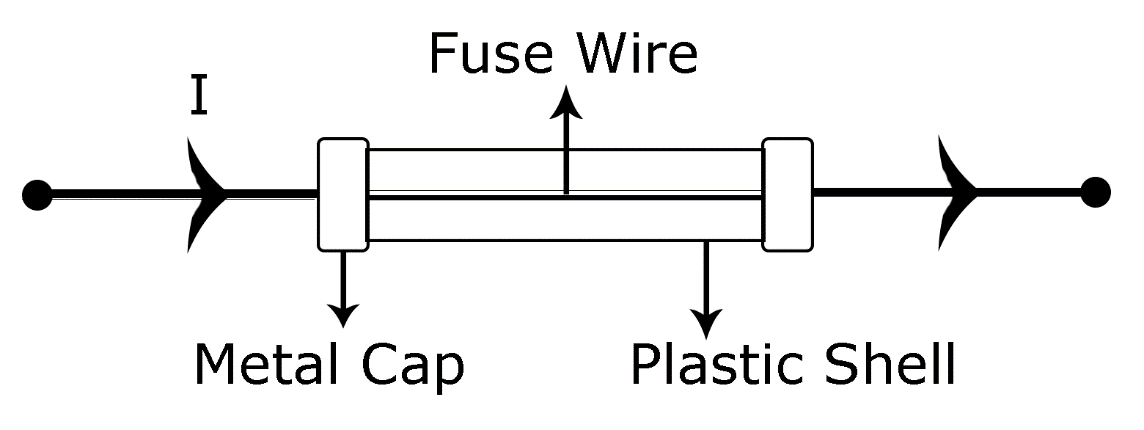
What is a fuse? How does it work?
Answer
580.8k+ views
Hint: Fuse is an electrical safety device that protects the circuit from short-circuiting, the fuse wire is made of tin alloys that have high resistance and low melting points. A switch is used before the equipment in the circuit in a series combination.
Complete answer:
Fuse is an essential safety device, used to save electrical circuits from overcurrent and short-circuiting, making it completely useless. Fuse is always made from metal because they are the best conductors of electric current and are readily available.
The basic structure of a fuse is relatively simple. There is a fuse wire, acting as the heart of the fuse system. The fuse wire is enclosed in a cylindrical plastic shell that has flat metal caps at the end and is connected to the fuse wire inside. This is depicted in the image below:

Electrical fuse can be made from any made, but, in actual practice, they are only made of tin alloys. It is because of the following reasons:
a.)Tin alloys have a higher resistance $(R)$ than most of its available counterparts like copper. So the heat generated by the wire $(P = {I^2} \times R)$ is also higher.
b.)They also have low melting points, which is necessary for the fuse wire to melt when the current surpasses the safe electrical current limit.
As already discussed above the fuse wire should have a low melting point, so that they easily melt and break the circuit, stop the flow of current in the circuit, and prevent danger.
As to whether the fuse should be connected in series and parallel, we should consider both the cases:
a.)If applied in parallel, we already know that the current will always divide equally between the circuit and the fuse, which is useless and defeats the purpose of the fuse system.
b.)If applied in series before the circuit, all the current will have to flow through the fuse before passing through the circuit and efficiently protects the circuit from harm.
Note:
The fuse is a really important electrical equipment, as a short circuit could lead to a potential fire that could prove lethal. The most conductive metal known to man today is silver $(Ag)$, but it cannot be used, because that would raise the price of silver fuse to economically unsustainable levels.
Complete answer:
Fuse is an essential safety device, used to save electrical circuits from overcurrent and short-circuiting, making it completely useless. Fuse is always made from metal because they are the best conductors of electric current and are readily available.
The basic structure of a fuse is relatively simple. There is a fuse wire, acting as the heart of the fuse system. The fuse wire is enclosed in a cylindrical plastic shell that has flat metal caps at the end and is connected to the fuse wire inside. This is depicted in the image below:

Electrical fuse can be made from any made, but, in actual practice, they are only made of tin alloys. It is because of the following reasons:
a.)Tin alloys have a higher resistance $(R)$ than most of its available counterparts like copper. So the heat generated by the wire $(P = {I^2} \times R)$ is also higher.
b.)They also have low melting points, which is necessary for the fuse wire to melt when the current surpasses the safe electrical current limit.
As already discussed above the fuse wire should have a low melting point, so that they easily melt and break the circuit, stop the flow of current in the circuit, and prevent danger.
As to whether the fuse should be connected in series and parallel, we should consider both the cases:
a.)If applied in parallel, we already know that the current will always divide equally between the circuit and the fuse, which is useless and defeats the purpose of the fuse system.
b.)If applied in series before the circuit, all the current will have to flow through the fuse before passing through the circuit and efficiently protects the circuit from harm.
Note:
The fuse is a really important electrical equipment, as a short circuit could lead to a potential fire that could prove lethal. The most conductive metal known to man today is silver $(Ag)$, but it cannot be used, because that would raise the price of silver fuse to economically unsustainable levels.
Recently Updated Pages
Master Class 10 Computer Science: Engaging Questions & Answers for Success

Master Class 10 General Knowledge: Engaging Questions & Answers for Success

Master Class 10 English: Engaging Questions & Answers for Success

Master Class 10 Social Science: Engaging Questions & Answers for Success

Master Class 10 Maths: Engaging Questions & Answers for Success

Master Class 10 Science: Engaging Questions & Answers for Success

Trending doubts
What is the median of the first 10 natural numbers class 10 maths CBSE

Which women's tennis player has 24 Grand Slam singles titles?

Who is the Brand Ambassador of Incredible India?

Why is there a time difference of about 5 hours between class 10 social science CBSE

Write a letter to the principal requesting him to grant class 10 english CBSE

A moving boat is observed from the top of a 150 m high class 10 maths CBSE




